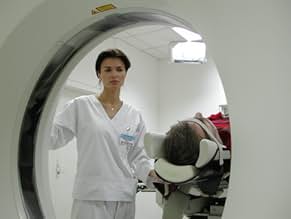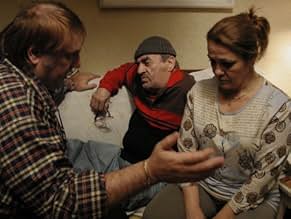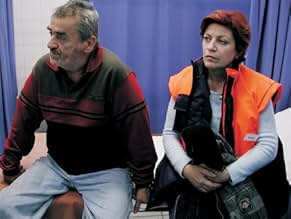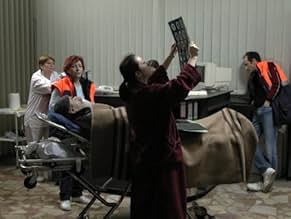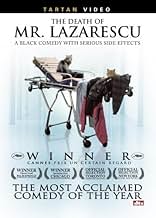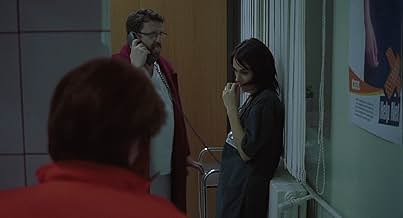Füge eine Handlung in deiner Sprache hinzuMr. Lãzãrescu, a dying old man, is shuttled from hospital to hospital by a loyal paramedic as doctors refuse to operate and no one can agree on a diagnosis.Mr. Lãzãrescu, a dying old man, is shuttled from hospital to hospital by a loyal paramedic as doctors refuse to operate and no one can agree on a diagnosis.Mr. Lãzãrescu, a dying old man, is shuttled from hospital to hospital by a loyal paramedic as doctors refuse to operate and no one can agree on a diagnosis.
- Regie
- Drehbuch
- Hauptbesetzung
- Auszeichnungen
- 30 Gewinne & 14 Nominierungen insgesamt
- Ambulantier
- (as Doru Boguta)
- Mr. Lazarescu (Domnui Lazarescu)
- (as Ioan Fiscuteanu)
Empfohlene Bewertungen
There are three levels one can see Puiu's film. The first is the relation between the single human and the medical system. 'Moartea domnului Lazarescu' is the anti-'ER' with the universal character of the paternal doctor, playing God just to hide his own lack of competence and his indifference is kind of universal.
Then we have the story of Dante (yes!) Lazarescu descending in five hours the spiral stairs between being a pauper drunken in today's Bucharest towards almost certain physical death. An yet, despite the gradual physical degradation admirably acted by Ion Fiscuteanu, Mr. Lazarescu keeps intact his moral and human dignity, even as he slowly slides into a comma.
I am not sure whether folks who did not live in Romania or other former communist countries will catch easily the third layer. Lazarescu lives in a world in decomposition. Dictature is gone, but no social help system replaced it, his family is far away, his neighbors are simple people, indifferent and hardly coping with their own problem. Yet, in this decrepit medium he will find in the assistant Mioara a caring person, who will not only try to save him, but will ease his last hours with the feeling that yet there is somebody who cared for him. It's not quality of life, it's more - quality of humanity.
A few years ago, my family called the ambulance for one of our relatives. He was having vague back pain -- we couldn't get him to communicate with us about it. He didn't want to go to the hospital, but his pain was too great for him not to. He is an alcoholic, and to this day lives under the assumption that none of us know he's an alcoholic, so I think his fear of the hospital had somewhat to do with the fear that his "secret" would be exposed. We ended up in a living hell of smug doctors, each with a different diagnosis of his condition, but who were all in agreement that the patient should be treated like dirt because of his addiction. If he wasn't going to care about his own health, they seemed to think, then why should they?
So needless to say, despite the fact that it takes place in Romania, "The Death of Mr. Lazarescu" hit frightfully close to home for me, as it's about a lonely, alcoholic man and his nighttime trip into the purgatory of emergency-room bureaucracy. The foreign setting aside, this film could have taken place in the USA and been no different. Nobody has time for Mr. Lazarescu, everyone has a different theory as to what is wrong with him, the nurses are more interested in making sure paperwork is filled out than they are in taking care of the living, breathing human being suffering -- and perhaps dying -- on the stretcher in front of them. In one scene, the doctors insult and belittle the ambulance nurse when she tries to offer her own assessment of Mr. Lazarescu's condition, holding their advanced schooling over and against her. We don't learn much about Mr. Lazarescu, and so we see events occur from the perspective of this paramedic who takes charge of him and carts him from one hospital to the next in a desperate attempt to find one that will treat him. To her, Mr. Lazarescu is a job, yet she's the closest thing to a caring relative he has, so cold and indifferent is the rest of the health care world.
This film is astonishing in its meticulous detail, and it's hard to believe it's not a documentary, something out of the world of Fredrick Wiseman. Most scenes are filmed in long takes, the camera standing back at an objective distance simply capturing the whirl of human activity taking place around it. The acting is amazing, for the very reason that no one seems to be acting. It's a deeply unsettling film; we know Mr. Lazarescu will likely die -- from cancer if not from the surgery he's about to undergo when the film closes, and anyway, the title tells us as much. But we don't see him die in the film -- the last scene is of him being washed, shaved and dressed for surgery, a human being reduced to a slab of living flesh on a table, robbed of even his last shred of dignity, while no one appears to care. Somehow, that lack of closure is one of the most unsettling things in the film; it captures the feeling one has when you've finally gotten your loved one to the hospital and all you can do is wait, not sure whether or not you're going to see him alive again.
Grade: A
Wusstest du schon
- WissenswertesThe film was shot in 39 nights in real hospitals. It was edited in 38 days.
- Zitate
Mr. Lazarescu (Domnui Lazarescu): Excuse me, Nurse, but how old are you?
Mioara Avram: I'm not that young anymore. I'm 55.
Mr. Lazarescu (Domnui Lazarescu): 55?
Mioara Avram: Yes. In September.
Mr. Lazarescu (Domnui Lazarescu): In September? Just like Virgil, my brother-in-law, only he's 68.
- VerbindungenFeatured in 2006 Independent Spirit Awards (2006)
Top-Auswahl
- How long is The Death of Mr. Lazarescu?Powered by Alexa
Details
- Erscheinungsdatum
- Herkunftsland
- Sprache
- Auch bekannt als
- The Death of Mr. Lazarescu
- Drehorte
- Produktionsfirma
- Weitere beteiligte Unternehmen bei IMDbPro anzeigen
Box Office
- Budget
- 500.000 $ (geschätzt)
- Bruttoertrag in den USA und Kanada
- 80.301 $
- Eröffnungswochenende in den USA und in Kanada
- 5.880 $
- 30. Apr. 2006
- Weltweiter Bruttoertrag
- 216.922 $
- Laufzeit2 Stunden 33 Minuten
- Farbe
- Sound-Mix
- Seitenverhältnis
- 1.85 : 1
Zu dieser Seite beitragen



